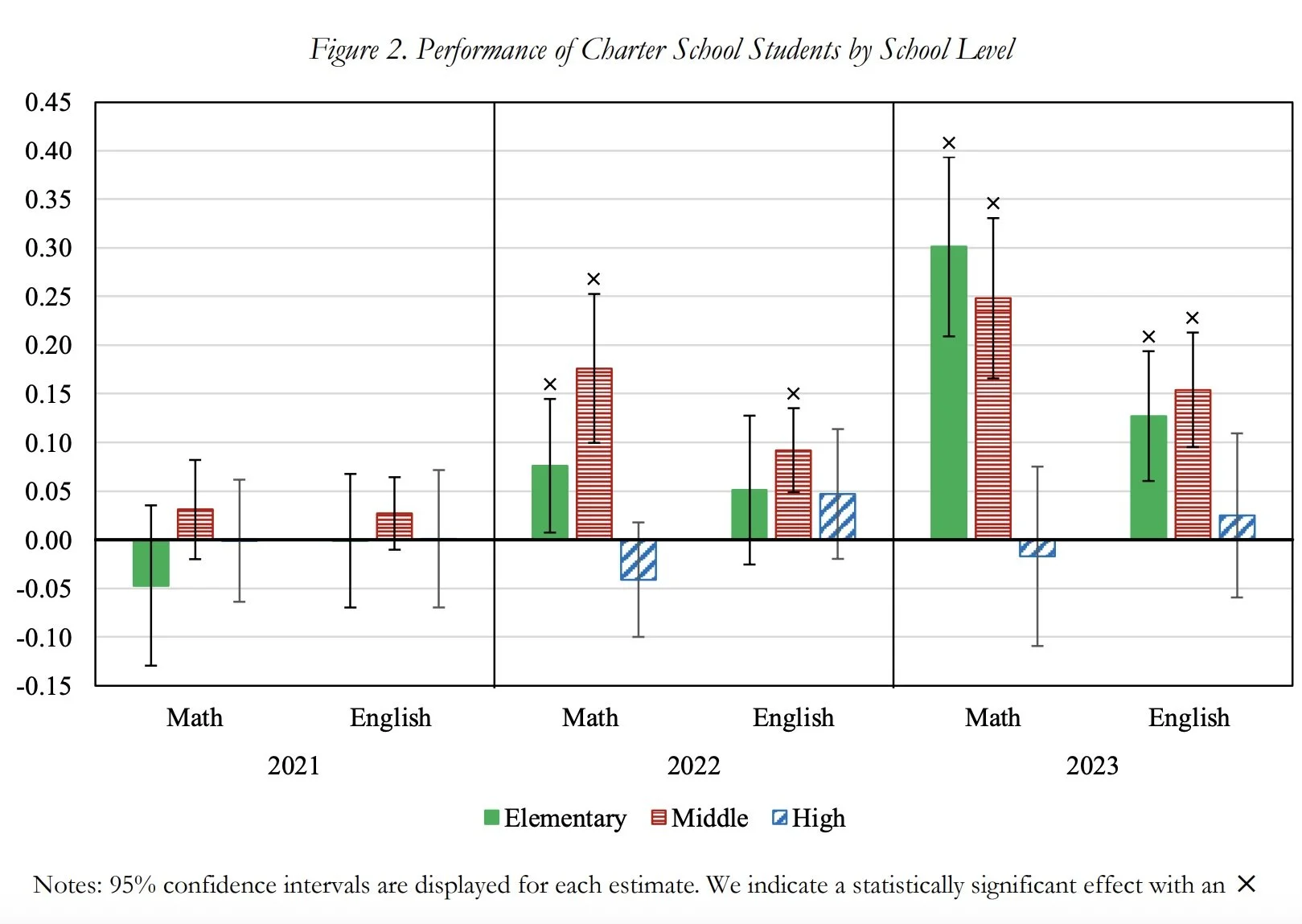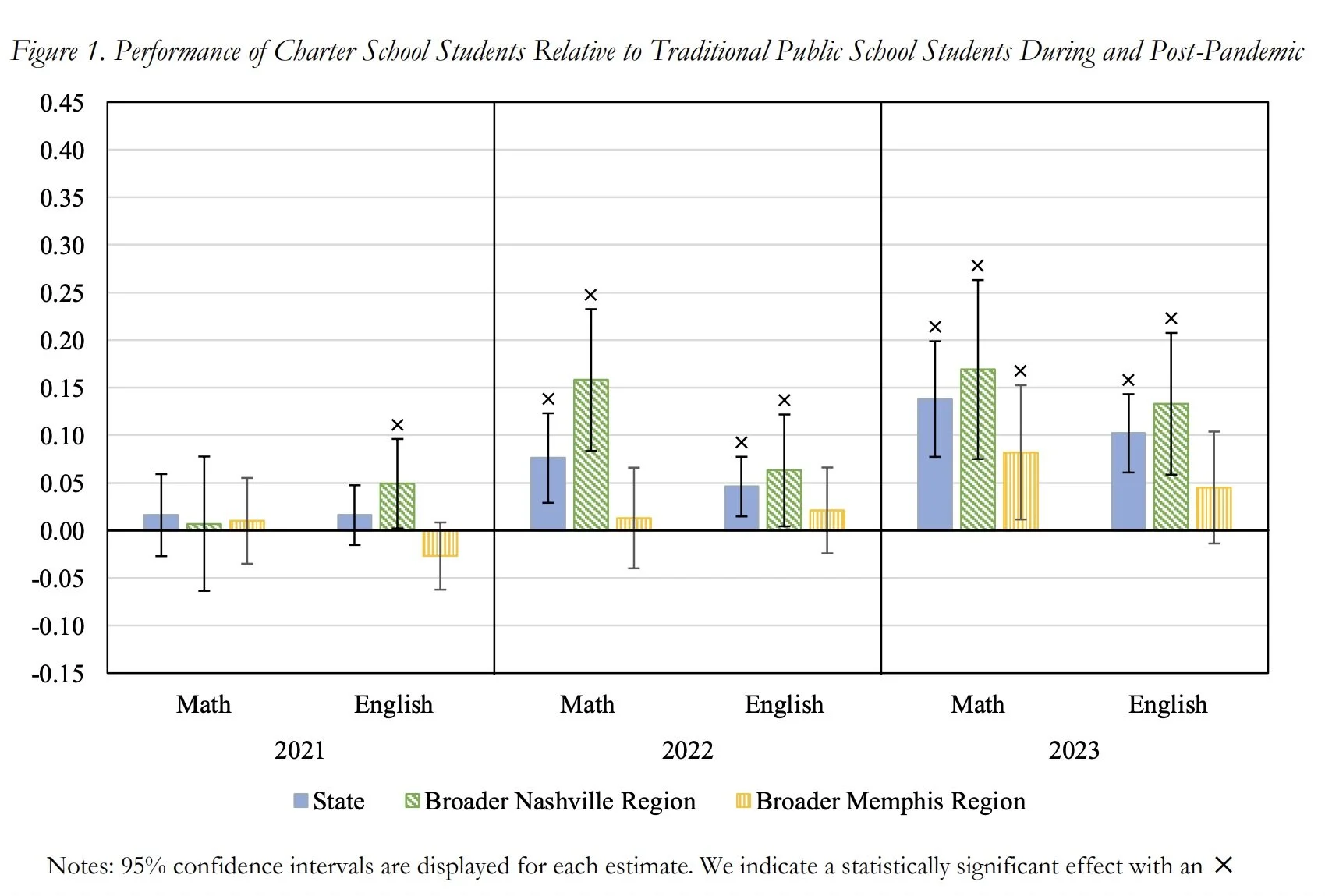Study Finds Charter School Students Outperformed Their Peers Following the Pandemic
Stock photo of student taking a test
Originally published June 24, 2025 and updated July 28, 2025 with quotes from TennesseeCan and the Tennessee Charter School Center.
A newly released study by the University of Kentucky and the University of Southern California found positive news for the pandemic recovery of Tennessee’s public charter school students.
The research of Tennessee’s more than 100 public charter schools found these students consistently outperformed traditional school peers in math and English language arts following the pandemic. The disparity is notable as the study found these same students performed on par with their traditional school peers during the pandemic.
Like What You Are Reading? Stay Connected!
Sign up for our newsletter to get the latest Tennessee education news.
Researchers speculate that Tennessee’s charters may have had an advantage in addressing the pandemic learning losses that impacted all students.
“Charter schools generally have more autonomy instructionally and structurally and therefore, theoretically, they may have been better positioned to pivot during the pandemic to serve students,” wrote researchers in the report.
Study Aims for “Apples to Apples” Approach
Researchers evaluated state testing data for the 2020/21 school year through the 2022/23 school year for the study.
To provide a more accurate “apples to apples” comparison, they additionally added greater weight to the traditional school students in the study that most closely resemble the demographics of charter school students.
Charter schools are free public schools operated by a non-profit organization under an independent contract or “charter” with a school district or the state. On average, they serve a higher percentage of economically disadvantaged students and students of color.
Disparity Driven by Nashville and Younger Students
The report found that the charter performance disparity is largely driven by students in Nashville and those in elementary and middle school grades.
Graphic by the University of Kentucky and the University of Southern California
Researchers found high school students across the state largely performed on par with their traditional school peers both during the pandemic and after. Elementary and middle school students exceeded traditional students by a “statistically significant margin” in the two years following the pandemic.
The region where students live also played an important role in the charter performance disparity, according to the report.
Graphic by the University of Kentucky and the University of Southern California
Researchers found Memphis’ charter students generally performed on par with traditional public-school students in all three years of the study, except for math in 2022/203. Nashville’s charter students outperformed traditional students in both subjects following the pandemic.
“Given that students generally experienced learning loss during the pandemic, these results suggest that lessons can be learned from Tennessee’s charter sector on how to best approach recovery,” wrote researchers.
Passionate Leadership and Structural Autonomy
Robert Vagi, Vice President of Research and Policy at the Tennessee Charter School Center, points to two key enablers of charter school recovery outlined in the report, passionate leadership and structural autonomy.
“Tennessee’s charter sector is blessed to have some of the most passionate and innovative leaders in the country,” said Vagi. “When those leaders are given the ability to respond quickly and flexibly to their communities’ needs, great things can happen.”
That flexibility translated into on-the-ground solutions. Schools like Leadership Prep used their scheduling autonomy to build skill-based intervention blocks, leading to some of the state’s highest proficiency gains among economically disadvantaged students. Similarly, Compass Community School – Berclair reduced its chronic absenteeism from 55.5 percent in 2021 to nearly zero percent in 2025 by implementing targeted attendance strategies.
“We’ve documented a number of these successful practices in our case study series,” Vagi said. “They’re examples of how nimbleness enabled rapid pivots that helped students stay on a positive trajectory.”
Chelsea Crawford, Director of Advocacy at TennesseeCAN, echoed that charter schools’ agility during the pandemic, especially in their early return to in-person learning, played a major role in student recovery.
“In Tennessee, we prioritized returning to in-person learning as soon as it was safe,” Crawford said. “Many charter schools were able to reopen right away. That made a huge difference in how quickly students could reengage and learn.”
She also emphasized the tight-knit decision-making structures within charter networks that allowed principals and school leaders to use data more precisely to support students.
Legislative Context and Policy Relevance
The study’s release comes as Tennessee lawmakers continue to debate the evolving role of charter schools in the state’s public education system. Recent legislation aimed to make the charter approval process more fair and Rutherford County Schools approved a new one last week.
Charter supporters point to the study as evidence that these schools are well-positioned to drive academic recovery and innovation.
“We hope policymakers see the results of this study and realize that investing in public schools’ ability to innovate—while ensuring autonomy and access to great talent—is the path forward,” Vagi said.
Continuation of research finding positive charter impact
The research is the latest to find that Tennessee’s charter school students are exceeding the performance of their peers.
A 2023 report from Stanford University found that Tennessee charter students gained the equivalent of an additional 34 days of reading instruction and 39 days of math.




